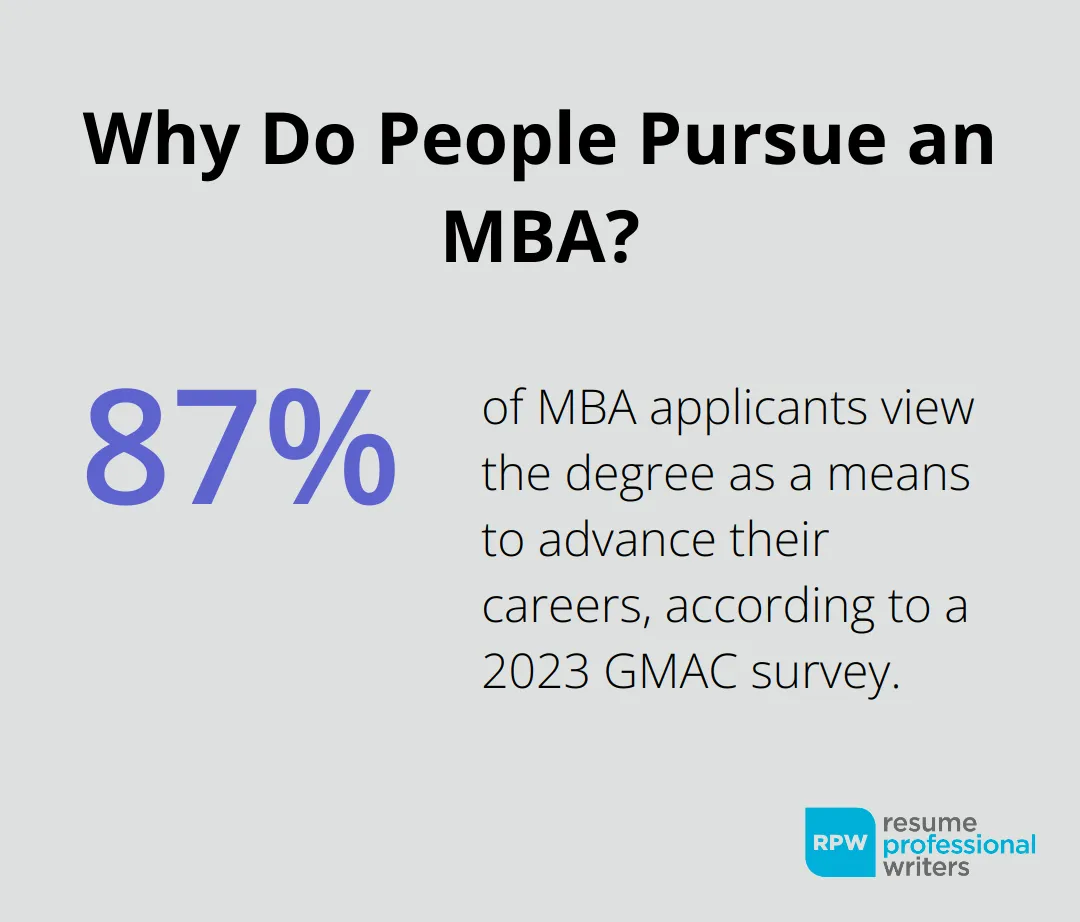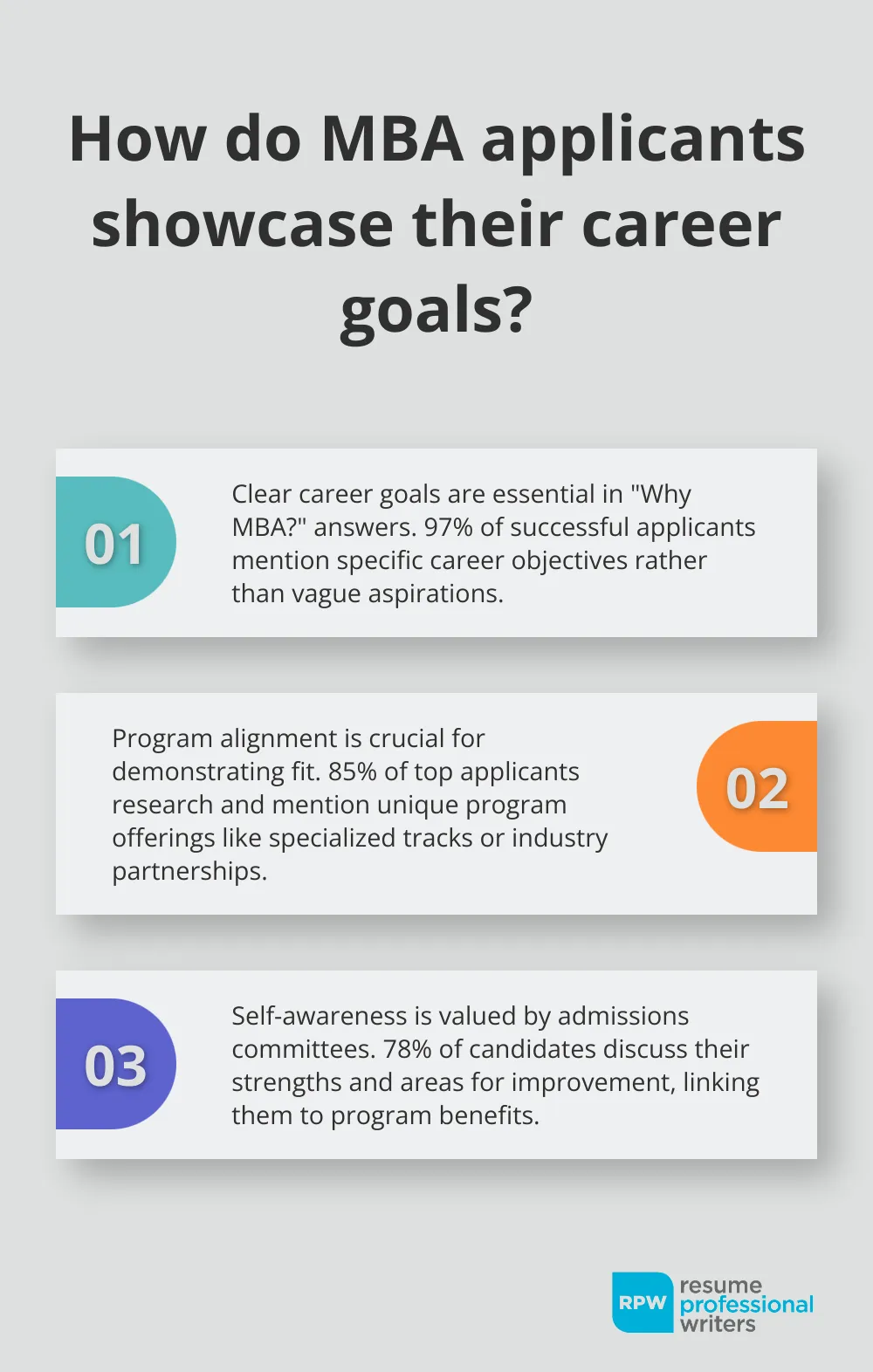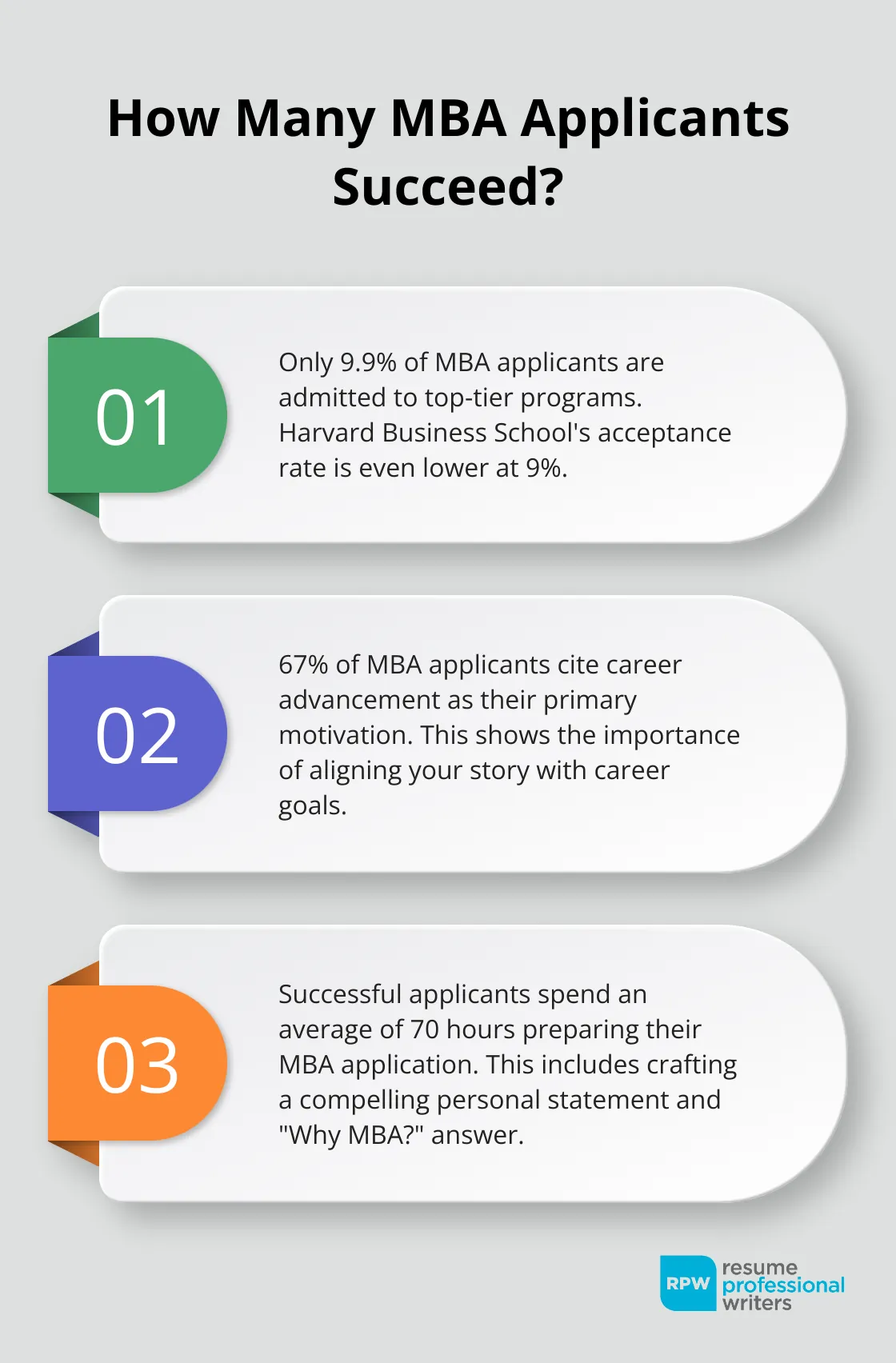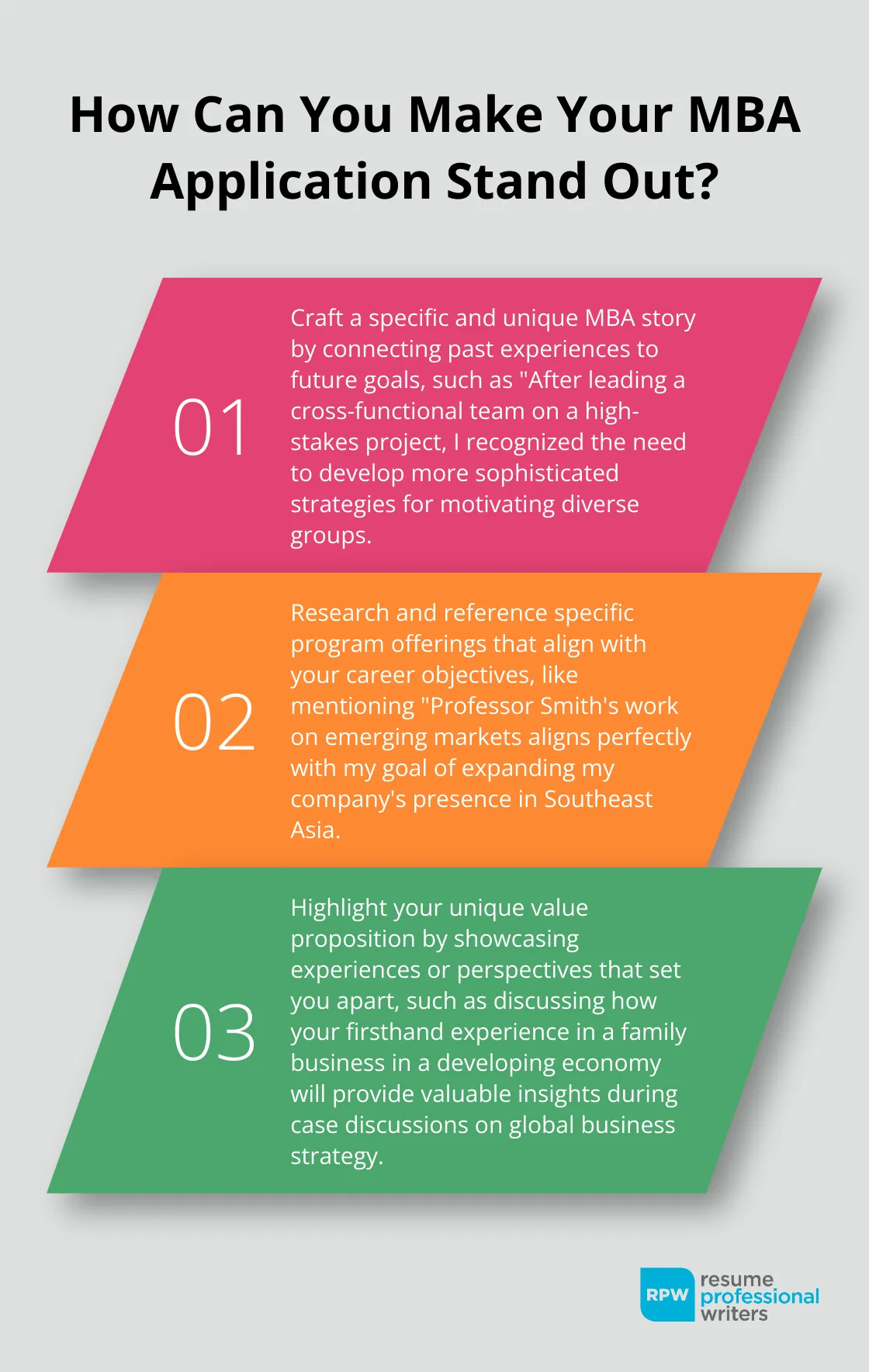We understand the importance of nailing your MBA interview. The “Why MBA?” question is a cornerstone of these interviews, often catching applicants off guard.
Knowing how to answer “Why MBA?” in an interview can make or break your chances of admission. This guide will equip you with the tools to craft a compelling response that showcases your unique motivations and aligns with your chosen program’s offerings.
Decoding the “Why MBA?” Question
The Strategic Importance
The “Why MBA?” question stands as a cornerstone of MBA interviews. Admissions committees use this question as a strategic tool to assess your fit for their program and your potential for future success. It’s not just a formality; it’s a gateway to understanding your motivations and aspirations.
Unveiling the Purpose
Admissions committees aim to gauge your career goals, self-awareness, and alignment with their program through this question. They want to see that you’ve thought critically about your career trajectory and how an MBA fits into that plan. A 2023 survey by the Graduate Management Admission Council (GMAC) revealed that 87% of MBA applicants view the degree as a means to advance their careers.
What Interviewers Seek
When you answer this question, interviewers look for several key elements:
- Clear, well-defined career goals (vague aspirations won’t suffice)
- Understanding of the MBA program and its alignment with your objectives
- Self-awareness – your ability to identify your strengths and areas for growth
Avoiding Common Missteps
Many applicants fall into predictable traps when answering this question:
- Generic responses: Saying you want to “enhance leadership skills” or “expand your network” isn’t enough.
- Focusing solely on prestige: While the reputation of the degree matters, it shouldn’t be the primary driver.
- Emphasizing salary potential: A higher salary may be a factor, but it shouldn’t be the main motivation.
Crafting a Compelling Response
To create a standout answer, focus on specifics. Highlight how the program’s unique offerings (such as a strong entrepreneurship focus) align with your goals (like launching a tech startup). This targeted approach demonstrates that you’ve done your homework and have a clear vision for your future.

The “Why MBA?” question offers you a chance to showcase your research, self-reflection, and career planning. It’s not just about impressing the interviewer – it’s about confirming that this MBA program is the right next step for you. As you prepare your response, consider how you’ll transition from explaining your motivations to discussing the key elements that make a strong “Why MBA?” answer.
Key Elements of a Strong “Why MBA?” Answer
At Resume Professional Writers, we understand the importance of crafting a compelling “Why MBA?” response. This chapter will explore the essential components that make your answer stand out to admissions committees.
Clear Career Goals
Your answer must reflect well-defined career objectives. Specific goals trump vague aspirations. For example:
“I plan to transition from my current software engineering role to product management in the tech industry.”
This statement is more impactful than a general desire to advance your career. The Graduate Management Admission Council survey is the definitive resource for business school application trends.
Program Alignment
Demonstrate how the MBA program aligns with your career goals. Research the program’s unique offerings (specialized tracks, internship opportunities, industry partnerships). For instance:
“The school’s focus on corporate social responsibility and relevant electives perfectly complement my interest in sustainable business practices.”
Self-Awareness
Admissions committees value candidates who understand their strengths and areas for improvement. Be honest about the skills you need to develop and explain how the MBA program will address these gaps. For example:
“I excel in data analysis but need to enhance my strategic decision-making skills for a senior management role. This program’s focus on case studies and experiential learning will help me develop these abilities.”
Program Knowledge
Show that you’ve thoroughly researched the school. Reference specific courses, professors, or initiatives that align with your interests and goals. For instance:
“Professor Smith’s work on emerging markets aligns perfectly with my goal of expanding my company’s presence in Southeast Asia.”
This level of detail shows genuine interest and commitment to the program.
Value Addition
Highlight the unique perspectives and experiences you’ll bring to the MBA cohort. Admissions committees want to know how you’ll contribute to classroom discussions and group projects. You might say:
“My experience leading cross-functional teams in a fast-paced startup environment will provide valuable insights during group projects and case study discussions.”

A strong “Why MBA?” answer weaves together your past experiences, future aspirations, and the unique offerings of the MBA program. The next chapter will guide you through the process of crafting your personal MBA story, ensuring your response resonates with admissions committees and sets you apart from other applicants.
Crafting Your Unique MBA Story
Uncover Your True Motivations
At Resume Professional Writers, we know that a compelling “Why MBA?” answer transcends a mere list of career goals. It’s a narrative that intertwines your past, present, and future. Begin by exploring your personal and professional experiences deeply. Identify the moments or challenges that propelled you towards an MBA. Be specific and honest about these pivotal experiences.

For example, instead of stating, “I want to enhance my leadership skills,” you might say, “After leading a cross-functional team on a high-stakes project, I recognized the need to develop more sophisticated strategies for motivating diverse groups and managing complex stakeholder relationships.”
Bridge Your Past and Future
Your MBA story should establish a clear connection between your past experiences and future aspirations. Admissions committees seek evidence that an MBA is a logical next step in your career journey, not a random decision or an escape route from your current job.
Reflect on your career trajectory. How have your roles evolved? What skills have you developed, and what gaps have you identified? Then, articulate how an MBA will help you bridge those gaps and propel you toward your long-term goals.
Spotlight Your Unique Value Proposition
Admissions committees curate a diverse and dynamic class, not just admit individual students. Your “Why MBA?” answer should highlight the unique perspectives and experiences you’ll bring to the program.
Perhaps you’ve worked in a niche industry or have experience in emerging markets. Maybe you’ve overcome significant challenges or possess an unusual combination of skills. Whatever makes you unique, ensure it shines through in your story.
For instance, if you’ve worked in a family business in a developing economy, you might discuss how your firsthand experience with the challenges of scaling a business in a resource-constrained environment will provide valuable insights during case discussions on global business strategy.
Align with Program Offerings
Demonstrate how the MBA program aligns with your career goals. Research the MBA program’s unique offerings such as top-tier internship and externship programs, where students apply their learnings to help companies with finance, investing, marketing, and data.
Showcase Self-Awareness
Admissions committees value candidates who understand their strengths and areas for improvement. Be honest about the skills you need to develop and explain how the MBA program will address these gaps. For example:
“I excel in data analysis but need to enhance my strategic decision-making skills for a senior management role. This program’s focus on case studies and experiential learning will help me develop these abilities.”
Unlock Your MBA Journey
Crafting a compelling answer to “Why MBA?” requires self-reflection, research, and strategic communication. Your response should weave together your unique experiences, clear career goals, and a deep understanding of the MBA program you’re applying to. Authenticity is key – admissions committees look for genuine passion and a clear vision for your future.

Preparation plays a vital role in how to answer “Why MBA?” in an interview. Take time to reflect on your journey, identify pivotal moments that led you to pursue an MBA, and articulate how this degree fits into your long-term career plan. Research your target programs thoroughly to understand their unique offerings and align them with your goals (this knowledge will allow you to tailor your answer and demonstrate your commitment).
Resume Professional Writers understand the importance of presenting yourself effectively in an MBA interview. We encourage MBA applicants to approach the “Why MBA?” question as an opportunity to tell their story and stand out from the crowd. With thoughtful preparation and genuine enthusiasm, you’ll deliver a compelling answer that resonates with admissions committees and sets you on the path to MBA success.








